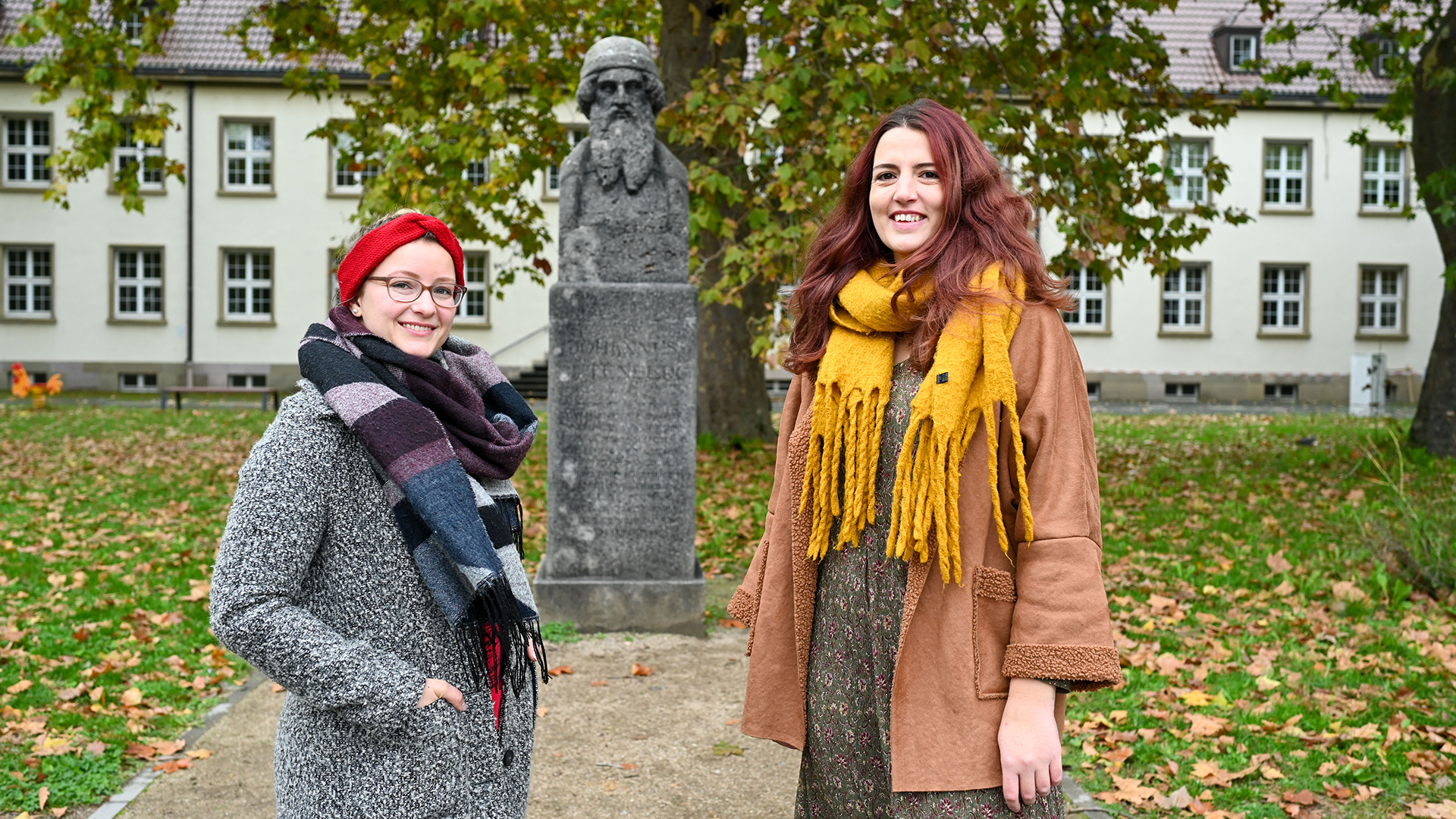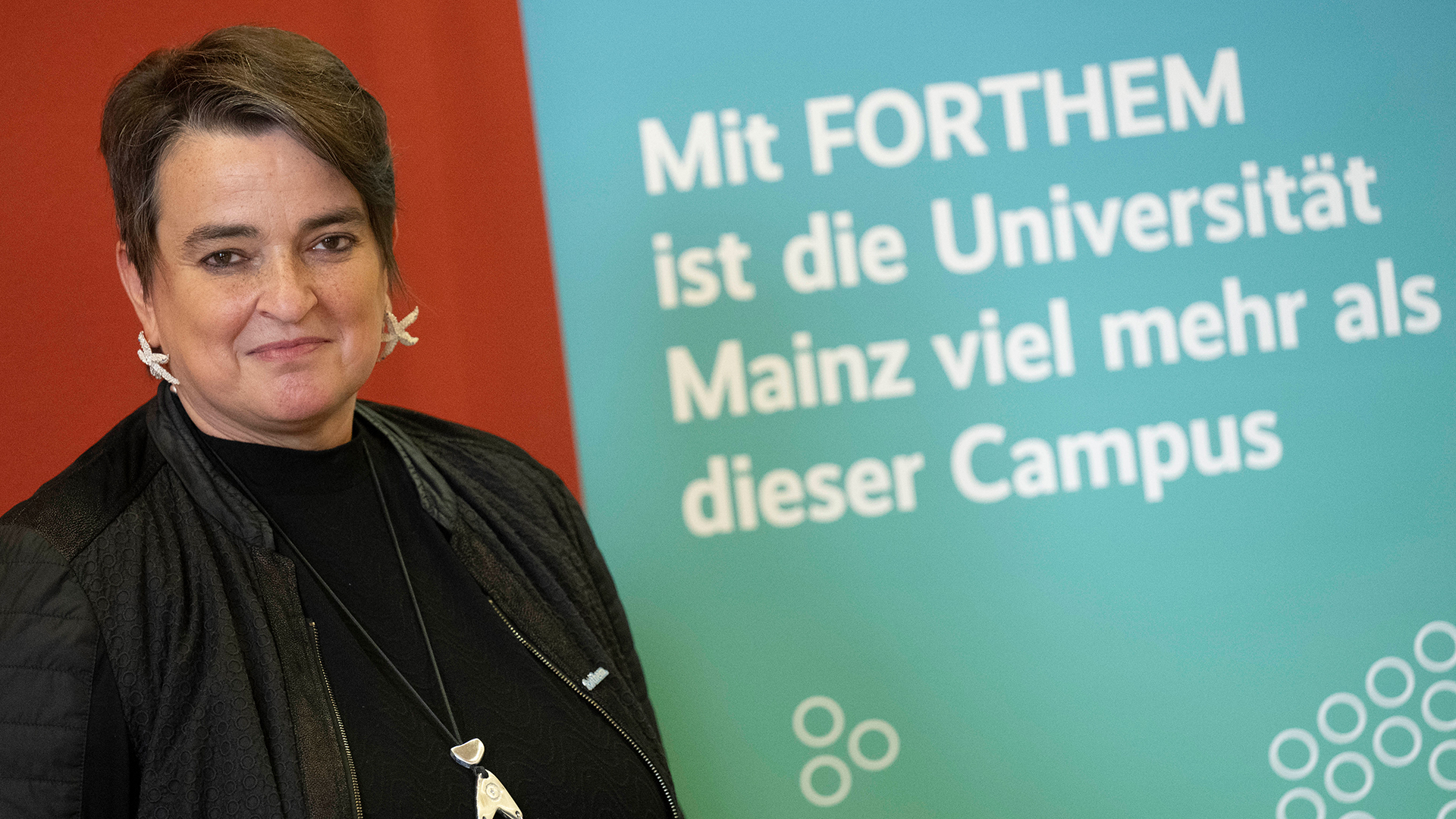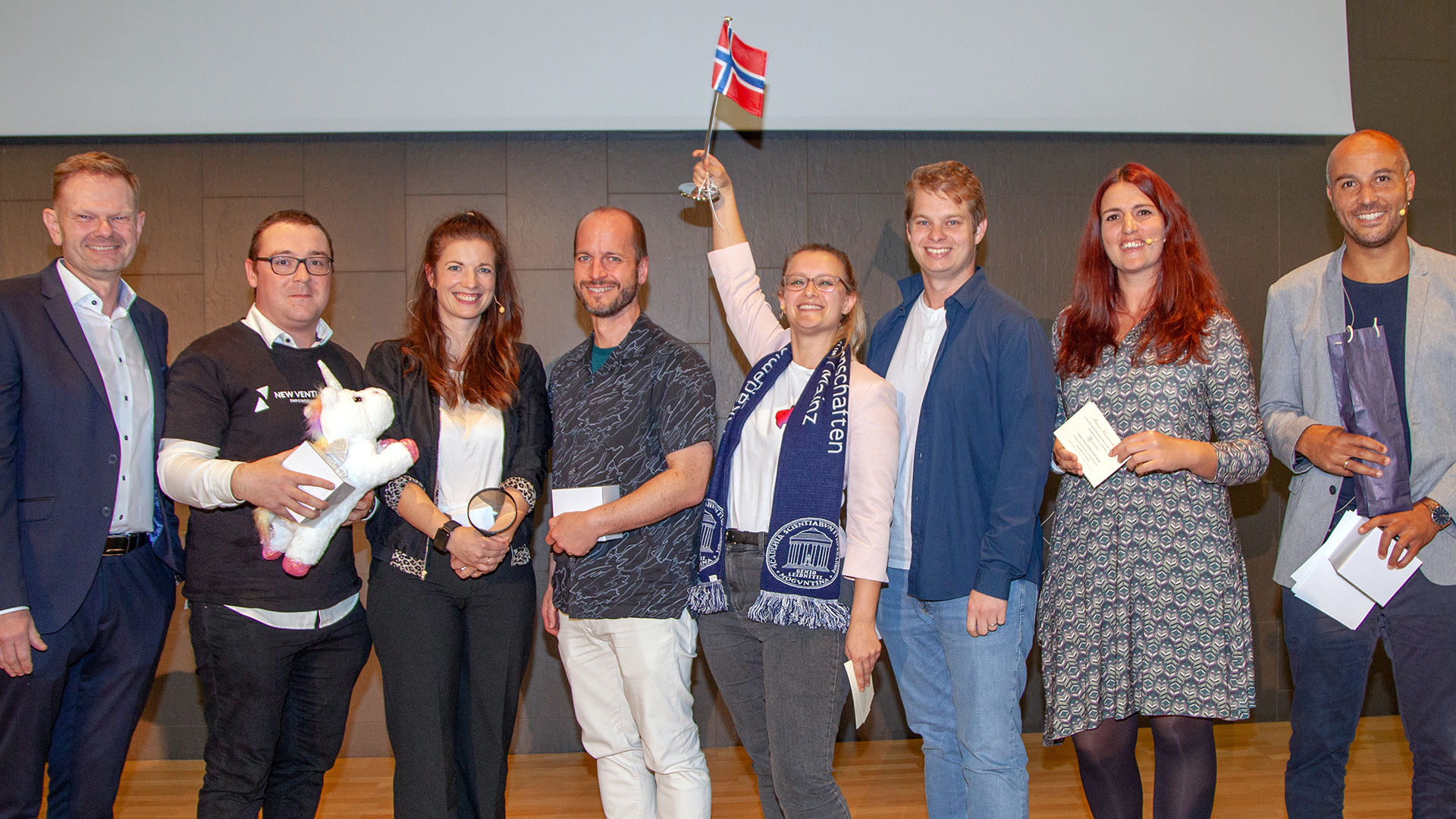31 October 2024
Annika Djolai and Elena Suárez Cronauer will be representing the Mainz research hub at the FORTHEM Researcher Grand Prix event in Agder in Norway. This international science slam will be premiering on 6 November 2024. The two young academics will be competing against early-stage researchers from five other universities of the FORTHEM Alliance, which comprises a total of nine higher education institutions all over Europe. Annika and Elena qualified for participation in Agder at the science slam organized by the Task Force Young Science in Mainz in September 2024.
A four-minute pitch is all the participants in the first FORTHEM Researcher Grand Prix will have to impress their audience. "We are used to giving presentations in English, but to do this in such a short time is going to be a real challenge," says Annika Djolai. The 28-year-old biologist based at Johannes Gutenberg University Mainz (JGU) came first in the local science slam in September 2024, organized by the Task Force Young Science of the MAINZ SCIENCE ALLIANCE, thereby winning her ticket to Norway. Her presentation "Let's talk about sex" provides insights into how biological sex is determined, how it can change dynamically over the lifespan of animals, and the challenges that arise from the separation of sexes. Second place at the Mainz competition was awarded to the historian Elena Suárez Cronauer, 32, of the Academy of Sciences and Literature in Mainz (AdW Mainz), thus also giving her the opportunity to take part in the FORTHEM Research Grand Prix. She will be talking on the subject of female networks revealed in letters of the Romantic period and new approaches to research into the roles played by women in literary production around the year 1800.
How do Annika and Elena feel about taking the stage at JGU's Norwegian FORTHEM partner university and are they nervous about the upcoming event? "No, I am counting the days", says Elena Suárez Cronauer. "The fact that so many young scientists from different countries will be present to network and discuss their research will be an exceptional opportunity for everyone there." Annika Djolai agrees: "In principle, a science slam is a competition in which you hope that you will manage to live up to your own expectations. But the atmosphere at gatherings such as this is always very friendly and supportive. I am looking forward to the Researcher Grand Prix – and to the chance to discover the country and its people."

The FORTHEM Researcher Grand Prix will be an international science slam on 6 November 2024 at the University of Agder located in Kristiansand in Norway. A total of eleven early-career researchers will be contending at the very first staging of this international research show. They will be representing six of the nine FORTHEM universities: Dijon (France), Jyväskylä (Finland), Opole (Poland), and Riga (Latvia) in addition to Agder and Mainz. The FORTHEM Researcher Grand Prix was inspired, in part, by the annual National Science Week in Norway called Forskningsdagene.
Great atmosphere, excited curiosity
But Annika and Elena are not the only ones counting down the days to the Researcher Grand Prix. Dr. Nicole Birkle, who has been General Secretary of FORTHEM since 2022 together with Dr. Tanja Herrmann, is also very excited about the event. Together with a science journalist and a performance expert, Nicole will form the jury for the slam competition. "We all have very different ways of assessing the presentations that await us," she says. The votes of the three-member jury will determine 50 percent of each score. The other half will be based on a poll of the public present at the event and voting online. Open science and science communication have always been major concerns of Nicole Birkle, who holds a doctorate in Classical Archaeology and is now manager of the FORTHEM Academy for Early-Stage Researchers. In her work for the FORTHEM Alliance, her main focus is on research, innovation, and transfer. Among other things, she heads up the recently established FORTHEM Academy for Early-Stage Researchers that organizes various support and continuing education services for young academics and got the 2024 Research Grand Prix up and running.

The first FORTHEM Researcher Grand Prix in Norway was mainly organized by the partner universities in Opole and Agder. In Mainz, the participants and the audience of the pre-final science slam at the Mainz Academy of Sciences and Literature got a taste of what to expect at the European event in Agder: all seats were taken, the atmosphere was buzzing and full of excited curiosity. There were two slam contributions each by members of JGU and the Academy of Sciences and Literature, together with a contribution by a member of the Mainz University of Applied Sciences and of the Max Planck Institute for Chemistry. As a result, the presentations covered a wide range of academic disciplines.
Entertainment, wit, and genuine enthusiasm for the science being presented are what the audience rewards at a science slam. The idea is to present a complex research question in a way that everyone can understand and get to the heart of the matter in a very short time. This is very different from more traditional forms of presentation, such as lectures. Thus, the two Researcher Grand Prix participants from Mainz were grateful for the preparatory workshops offered in cooperation with "science stories", the leading German-language agency for science slam coaching. "These workshops were a great support," recalls Annika Djolai. "From the initial questionnaire to the interaction with the other participants in the workshop, we ended up becoming a real team." Elena Suárez Cronauer reports that the specific challenges of the slam situation were fully addressed in the workshop. "I had already taken part in the WissKomm Academy program of the Mainz Academy of Sciences and Literature, a series of seminars on science communication. Although I had already attended a workshop on presentation rhetoric, performing at a slam is completely different from presenting at a scientific conference."
Scientifically accurate, easy to understand
Their participation in the science slam in September was Annika's and Elena's debut on this kind of stage. Previously, they had always been on the other side of the event – as members of the audience. In the preparation workshops, the participants benefited from the exchange with the other young academics from different fields. This was good exercise in presenting their chosen topic in a precise and scientifically accurate, yet generally understandable way. Then came the moment to take their place on the stage.
"You can prepare for this to a certain extent. The day before, I looked around the hall and gave my speech there to get a feel for the atmosphere of the room," recalls Annika Djolai. She did grow a little nervous just before her own performance. "But once the first one or two of my quips went down well with the audience, I was able to relax. After that, I really enjoyed giving my presentation."

Annika Djolai studied Biology and Molecular Biomedicine in Mainz, Manchester, and Münster. She has been working towards a doctorate in Evolutionary Genomics at JGU since 2022. Her lecture "Let's talk about sex" deals with the way that – in some animals – sex can change dynamically over the lifespan. Take the bluehead wrasse, for instance. The population of this fish lives in harem-like communities. If the male dies, the largest female of a group transmutes into the new male. Clownfish, on the other hand, can change from male to female while the broad-barred goby can change its sex in both directions.
"A science slam is a fascinating setting, different from the usual academic lecture situation," says Elena Suárez Cronauer about the pre-final in Mainz. "I was quite nervous just before going on stage, even though I am used to giving presentations. But once I was there in front of the friendly audience, I calmed down immediately."
Elena Suárez Cronauer studied History and Archaeology in Mainz and Santiago de Compostela as well as Digital Methods in the Humanities and Cultural Studies in Mainz. She is currently a research associate in the AdW Mainz digital humanities project "Correspondences of Early Romanticism. Scholarly Edition – Annotation – Network Research", sponsored by the German Research Foundation (DFG), and she is writing her thesis at the University of Marburg. In her talk on female networks revealed in the letters of women writers of the Early Romantic period, she demonstrates how authoresses and female translators in the years around 1800 were discriminated against and marginalized because of their gender and the patriarchal and political structures predominant at the time. New digital method, such as historical network analysis and the theoretical framework of Data Feminism, provide a fresh approach to the subject.
Curtains up for the Grand Prix
Annika and Elena are as excited about the premiere of the FORTHEM Researcher Grand Prix as Nicole Birkle. As a member of the jury, she has been preparing extensively for judging the science slam contributions. "What I find particularly interesting about our Researcher Grand Prix is that the local slams were all held in the corresponding local language, but everyone will have to speak English in the final in Norway. This will be an additional challenge for both sides – for the presenters on stage and for the jury." Academic events of this kind, she adds, are very important for FORTHEM: "Events like this promote a sense of togetherness, of being a community." At the same time, the Researcher Grand Prix is not just about entertainment. It gives the participating early-career researchers insights into state-of-the-art scientific communication, which can include the use of video abstracts and appearances in various media. "In Agder, we offer the finalists an international platform to raise the profile of their own research projects and outline them on the big stage."
Text / Translation: Peter Thomas / JGU
